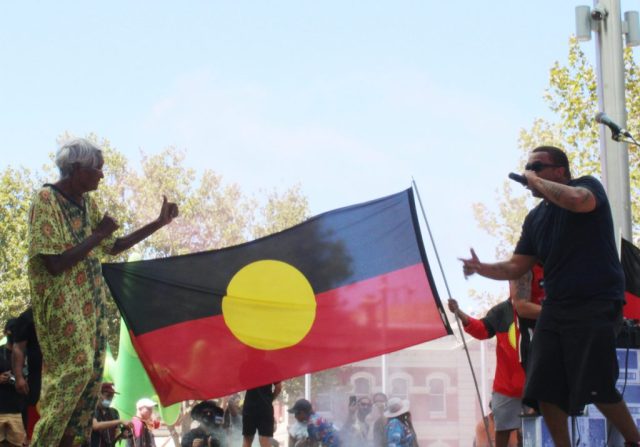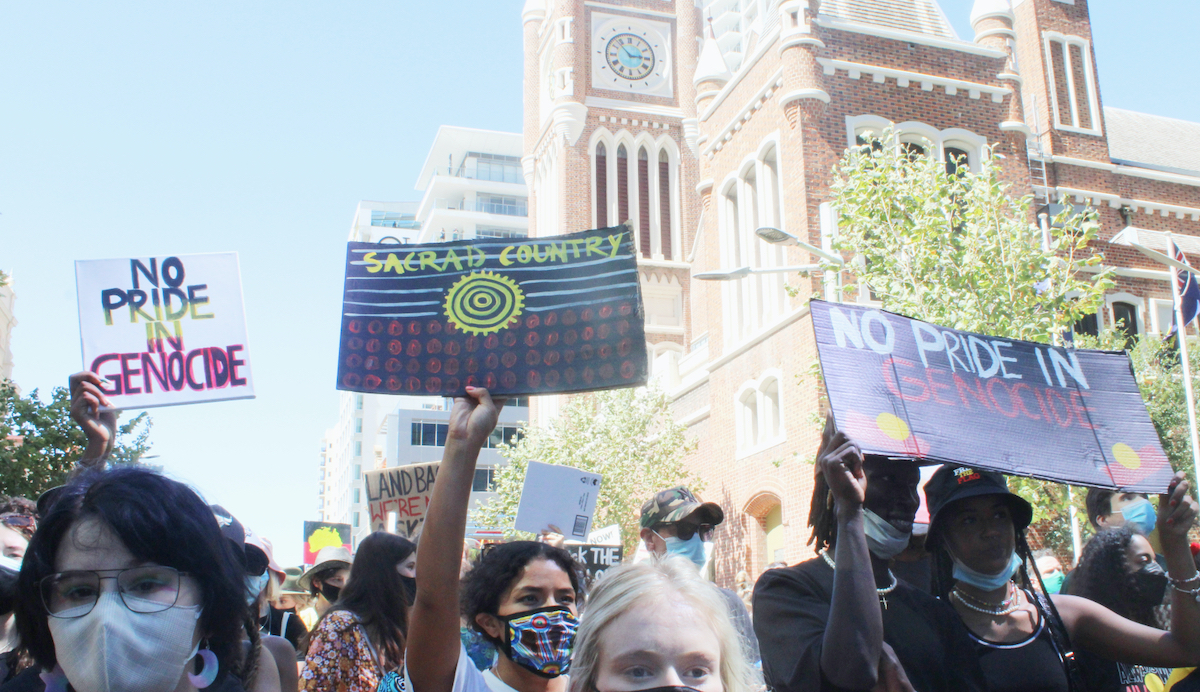Photo by Udhaya SK
By Angela Aris
On January 26th, 1788, the British invaded and colonised Australia, murdering thousands of First Nations people. This event devastated the lives of Aboriginal Australians who have lived in this country for over 50 000 years. The deep pain and trauma caused by this event are felt by Indigenous Australians 365 days a year. Australia Day is significant because it marks the beginning of a tragedy. This article is intended to amplify the voices of Indigenous Australians, often drowned out by those who hold power in the political arena.

Photo by Udhaya SK
I was in attendance on Wednesday at the Invasion Day Rally in Forrest Chase, nestled amongst hundreds of other Australians outraged by the Australia Day celebrations.

Photo by Udhaya SK
The overarching themes of the day were:
- Listening
- Respect
- Pride
Respect was the word of the day on Wednesday, and the most powerful way to show respect is to listen.
Here are some quotes I compiled from Indigenous Australians:

Photo by Udhaya SK
“To people who celebrate the 26th, Australia Day represents the day Cook ‘discovered’ Australia; however, Australia wasn’t discovered by Cook. There were people here living harmoniously for thousands of years before then. People need to understand that the 26th doesn’t represent anything but genocide, trauma, pain, and dispossession of land. It’s not a day to celebrate, we need to stop running and hiding from the dreadful past of our country and acknowledge that First Nations people were here first, and that was taken from us.” – Anonymous.

Photo by Udhaya SK
“The Australian people should celebrate Australia Day because they have a history and are proud of their ancestors, but as long as they acknowledge that Australia has an ancient history. The past is very important to the Aboriginal people. And the injustice that happened to our people, if they can recognise that, the road ahead for reconciliation will be much smoother and much better. If the Australian Government allows our people to be a part of the policy-making decisions in Canberra, we could make a difference and do it together… We are proud of our history, we are proud of our achievements, and we are very proud to work together with all Australians.” – Harry Graham.

Photo by Udhaya SK
“The message is respect. Respect us. We are the oldest race in the world. Respect us. We are the oldest living race in the world… Stand tall look after our elders today. Any elders here, we have to make sure they got that care. That water. We gotta make sure they got that mask. We gotta make sure they got clear when they’re walking. And when we talk to them, we have to be clear. Because clarity is what it’s all about… Walk proud. All you young fellas walk proud. And when you go into Perth City, be proud to be a Noongar man. What we need to do is look after them young fellas. And teach them. There’s still racism here. And racism, that subtle racism is the strongest racism going. That subtle racism must be annihilated out of us… Our way is strong. We’re still connected. We’re still a part of the surroundings. We still chuck sand in the Swan River. We still appreciate it when we put the ochre on. And when you do the smoking ceremonies, that’s all appreciation. Our culture is strong, and we still live strong. That’s what we do.”– Nigel Wilkes.

Photo by Udhaya SK
“But do people know what happened to us blackfellas? Do people know what really happened to us? No, they don’t. We had to get out of this town, Perth, by 6 o’clock. And if we weren’t out of town by 6 o’clock, we’d go to jail for 6 months. Sometimes we’d go across to Rottnest Island. You were never coming back. When our mob got onto those boats, and we waved, we knew they wasn’t coming back. Rottnest was a prison camp for our own people. Our people are buried in there. So, everyone needs to realise that there is history in Australia and that history is a black history.” – Speeches.

Photo by Udhaya SK
“Today was really positive. You’ve seen a lot of people come together, and that’s incredible. A lot of Aboriginal people and a lot of non-Indigenous people. All our brothers and sisters, all a part of the human family. We see death every day. Suicides. Incarceration. Death in custody. Homelessness. What this says to me in terms of Invasion Day is we were settled on a lie; that it was on unoccupied land. That wasn’t the case. So, we’ve come out to say no more. We’re gonna keep fighting this. We’re gonna keep taking it to the streets. And we’re gonna use every tool imaginable to make the government listen. We’re trying our best because incarceration has increased. One in twelve Aboriginal men are in prison today [It hasn’t increased for non-Indigenous people]. 6000 children in care in Australia, of that 76% are black. Of that, the majority are down here in Noongar country. So, it’s really terrible. It’s devastating. It’s an inditement on the Western Australian Government to let so many people die on the streets. To let so many people be removed. The Department of Child Protection has a 6-billion-dollar budget around the nation, and only 17% is spent on child support. We’re holding the hands of little babies in the hospital on life support. And they’re no longer here. They need that healing. They need that validation. In terms of the Royal Commission into Aboriginal Deaths in Custody, no one has been convicted. There’s been no accountability. Since 1991 there have been 399 recommendations [not implemented]. So, it may be Invasion Day, but we’re invading back, and we’re saying enough’s enough. And we’re going to fight this with every breath that we have because that’s what our ancestors did.” – Megan Krakourer, National Suicide Prevention and Trauma Recovery Project Director.

Photo by Udhaya SK
I found the rally to be a highly enlightening and educational experience. I became aware of just how little I knew about the travesties of Australia’s past, inspiring me to do my own research. I was enamoured by the generosity and empathy that the people I spoke to showed for white Australians. I observed the tremendous respect Indigenous Australians have for one another and how it is taught. There is a large degree of importance placed on raising strong, proud young people who take care of their elders and community. I was touched to be referred to as ‘sister’ multiple times while talking to the event organisers.
Pelican wishes to acknowledge the traditional owners of the lands on which our publication is produced – the Whadjuk Noongar people. Pelican recognises that these lands were never ceded. They were taken.

